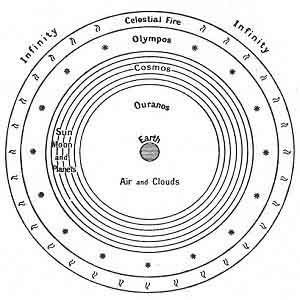(569-475 BC)
Pythagoras was one of the first Greek astronomers. He was extremely passionate about the world around him, but was somewhat veered in the wrong direction from the thought that the stars and the Earth were "perfect", and he believed the perfect shape was in fact a sphere, so in retrospect, he was right about certain things (roughly the shape of the planets), which was impressive for the technology at his time.
Pythagoras developed the "Pythagorean paradigm", which was an extremely basic model of the universe. It is referred to as a "geocentric" model, meaning the Earth was placed in the center of the universe. Surrounding the perfectly spherical Earth were the other planets, described as "crystal balls", including the sun, all orbiting the Earth in perfectly circular orbits.
But one problem Pythagoras was faced with, occurred in the orbits of the planets. The stars continued moving in the same direction with each passing day. But the planets seemed to move forward, as well as backwards in contrast to the stars, this is called "retrograde motion". To explain this anomaly, Pythagoras modified his diagram to include "epicycles", these epicycles were literally orbits within orbits; that is, each planet was orbiting a smaller invisible force, while orbiting the Earth.
All in all, Pythagoras had a misleading theory of space, but for his time, his theory was very intelligent, and he was one of the first people to question this idea of retrograde motion. Pythagoras played a very important role in mankind's understanding of space.
This is a very simple sketch of the Pythagorean Paradigm, with the Earth in the very center, and perfectly circular orbits.

